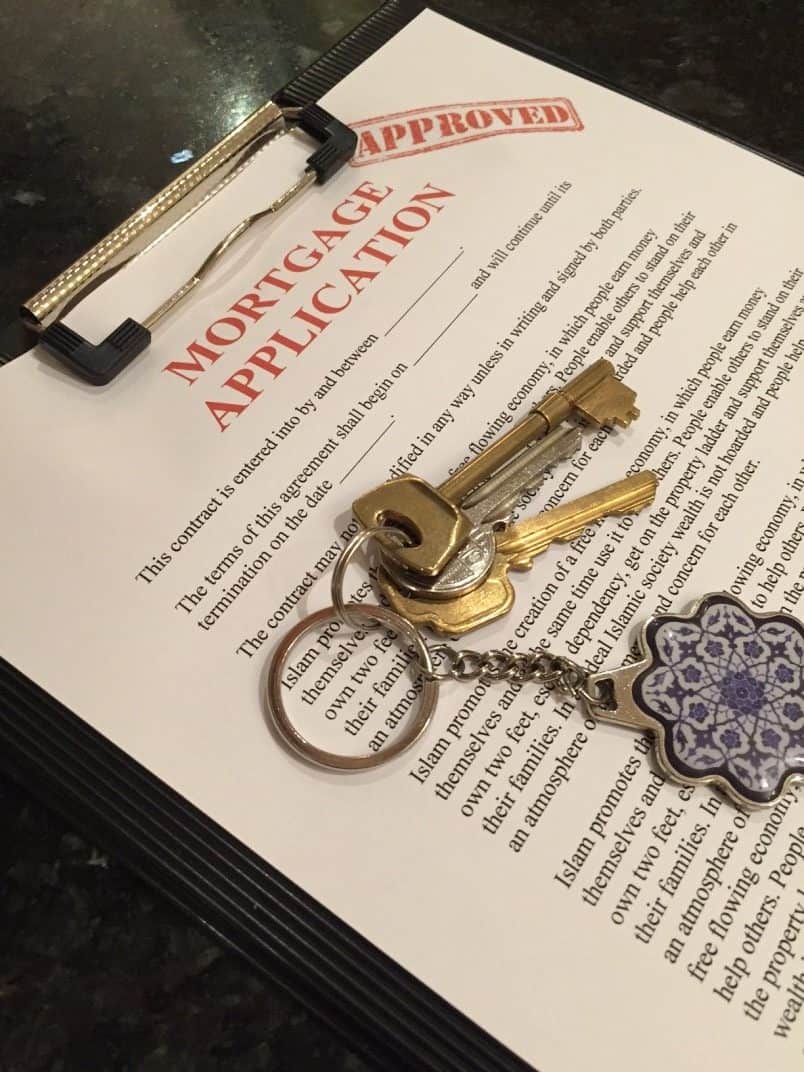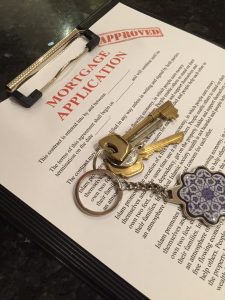Islamic Mortgages, Insurance and Loans

Stuck between a Rock and Hard Place.
Confused.com …about Mortgages, Insurance and Banking
The Dangers of Riba
Riba literally means increase. Known widely as ‘interest’ and ‘usury’, it is the charge levied for ‘using’ money. In other words, it is where one party makes a profit through lending to another party.
It is the increase of money without risk and without effort.
Imam Bukhari narrated that the Prophet (peace be on him) related what he saw in a dream:
‘… we came to a red river like blood, I saw a man swimming in it and another on the river bank had gathered many stones. The swimmer started swimming toward the man on the riverbank and when he got to him, he opened his mouth to feed him the stones.’ Then the Prophet (peace be on him) said, that is the riba eater.’ (Bukhari)
When is Riba Permissible?
The ayahs on riba are crystal clear and the hadith confirm that a loan which is returned with increase is impermissible and hugely sinful in Islam. However in situations of dhoroora (necessity), what is haram becomes permissible- the classic example being the man in the desert who will die unless he eats a ham sandwich. There are five areas to which the shariah preserves our right. These are faith, life, health, wealth and preservation of lineage. If any of these are threatened, this would be a necessity.
Examples of things that constitute necessity: a home, a car if you can’t manage without it for your work, medical treatment and education.
Mortgages
House prices are so high now, that very few people can buy without taking credit. Interest based mortgages contain riba. Yet, owning a house is a necessity. Some people argue that owning is not a necessity, as renting is an option. However permanently renting a house is a waste of money. Home ownership gives peace of mind and enables the Muslim ummah to be rooted and secure. An ummah which is struggling to pay rent and living in temporary accommodation cannot help itself let alone others.
In surah Nahl we are told:
‘It is Allah who made out of the things He created, some things to give you shade; of the hills He made some for your shelter; He made you garments to protect you from heat, and coats of mail to protect you from your (mutual) violence. Thus does He complete his favours on you, that ye may surrender to His will (in Islam)’. (16:81)
From this we can see that shelter is one of the things Allah Almighty promised us.
Here are our options:
- Research Islamic mortgages and if you can afford it, this is the best option. It may seem similar to conventional mortgages, however just as a halal chicken appears no different from a non-halal chicken, there is a world of difference between the. Similarly, the Islamic mortgage is halal.
The problem with Islamic mortgages is that there are limited providers and they often require a larger deposit which may make them inaccessible.
- Ask family and friends for an interest free loan.
- When you have exhausted these two possibilities, you may take out a conventional mortgage but try and minimise the level of interest. For example an off-set mortgage reduces the element of interest against your savings. Try and repay the mortgage as soon as possible.
Buying subsequent properties are not a necessity. Therefore taking out a mortgage to finance rental properties would be impermissible.
Home Insurance
Buildings insurance is permissible if you would not be able to cover the rebuilding cost of your house if the need arose. Home contents insurance is not permissible.
The concept that someone in difficulty is helped by others pooling their money is rewarding; this is why we have the takaful insurance – the cooperation insurance. It’s a good thing but these two elements is if you were to get rid of them is a very rewarding exercise, rewarding contribution. Thus the concept of insurance is not a bad thing, but the way it is calculated make it haram. There are two elements, which make insurance haram: i) the ambiguity ii) the interest (riba) that it includes. The premiums are invested in interest-based investments. This is what contaminates the money.
If you can get Islamic insurance that is fine. Unfortunately we do not have Islamic insurance in the UK at the moment.
If it is a requirement of your mortgage, then you have no choice, you can get it, but get a basic policy for the house, not contents etc. unless there is a special need for that. Do not go beyond what is required.
If it’s not a requirement and you don’t have a mortgage, is it OK to have a structural basic home insurance?
It depends where you live. If you live in an area where there are potential problems, like flooding then your insurance will be high but you can get it. If there’s no need, then do not get insurance. Each individual has to weigh up their own situation and decide.
If you live in an area where there is a lot of burglary can you get contents insurance?
Again it’s up to the individual to decide. If he’s in an area where there’s plenty of theft and burglary then he should get as much security as possible, such as burglar alarms and surveillance cameras etc to minimize this happening.
Student Loans
As with buying a home, education is not only a necessity but key in having a productive ummah that benefits society as well as enables Muslims to do dawah and spread the message of Islam.
Investigate halal options first. The government may be launching Islamic Student loans in the future. If there are non interest-based ways of financing education, then opt for them.
However, if the alternative to taking out a student loan and going to university is sitting at home waiting to get married, or being dependent on parents a student loan is a no brainer.
Car Insurance
Having car insurance is a legal requirement. Therefore it is an obligation to buy this.
Life Insurance /Breakdown Cover for Homes and Cars and Appliances.
In general insurance is not permissible because of two reasons. It is often riba-based and secondly it is an unclear contract. It is like gambling, in certain situations you win and in others you lose.
If taking out life insurance and income protection is a condition of taking out your mortgage and there is no alternative, then you can take it because it is an obligation. However if you can find an alternative, that is better.
If your situation is such that your home is in constant need of repair; your car keeps breaking down/home has problems/ boiler is old but you cannot afford the costs of repairs, then taking out cover may be a practical solution to your problem. However it is disliked and if you can find an alternative, that is preferable.
Medical insurance
If there is no need, then you do should not take it. However in the UK these days it has become a need, as the NHS is in chaos, people are waiting for long times to be seen and not getting treated, so we need an alternative to protect ourself and our family. People have to assess the state of the services where they live and decide accordingly.
Credit Cards
It is acceptable to use a credit card as long you repay the credit without interest.
Buying a Car
If there are charges for buying a car over a period of time, these constitute riba. Investigate the possibility of redrafting the agreement, so that the structure of the loan does not have interest in it.
Investments
It is important to know where your money is invested, so that it is not being used by industries which deal in haram products including alcohol, riba and porn. Some products are not haram themselves, for example arms, however it is important to ‘close the means to evil’ so investing in the arms industry should be avoided as you do not know whose hands those lethal weapons could fall into.
If you rent a property to a business and a portion of the company’s income is haram, the proportion that is haram should be minimal (e.g. not more than 5% of its turnover) and you should purify your income by distributing 5% of the rent to good causes, without expecting reward for that amount.
Jobs in Banking
Unless you are working in a conventional bank with a view to gaining experience so that you can promote Islamic Finance later on, jobs in banking are about as desirable for a Muslim as a job in a brewery. If the job in the bank is not specifically related to riba-based activity, it is still a cursed atmosphere, so it is preferable to work for another company whose income is not haram.
Remember that barakah is not necessarily apparent at face value but is present in the ‘stretchability’ of your wealth. A huge profit on paper can be undermined by soaring costs, whereas a seemingly modest amount could provide protection and ease. So a job in a halal sector may not seem as lucrative a career as others, but there will be barakah in halal rizq.
Pyramid Schemes
Avoid vague and deceptive financial schemes, such as pyramid schemes. In these, an organisation compels individuals to join and make a payment. In return, the organisation promises its new members a share of the money taken from every additional member that they recruit.
For the directors at the top, the scheme can be a money spinner, whether or not they do any work. However those at the bottom of the pyramid keep channelling money to the top while seeing little benefit themselves. Don’t be duped.
We need to use our judgement and where possible find non-interest bearing solutions for our needs. Where our needs are real necessities, then it is not sinful to pay riba. Try and minimise the riba content in the transaction. Allah Almighty wants a fair system for all and we have our part to play by not sustaining a corrupt financial system.
Shaykh Haytham Tamim is the Vice President for Europe of the Association of Shariah Scholars in Islamic Finance
Islamic Mortgages, Insurance and Loans
Should I Invest in Cryptocurrency
What Do I Need to Know about Tawbah
Recommended Posts

Is it permissible to take out a student loan?
April 02, 2024

Riba – riches or ruin? – Tarawih reflections 12
March 21, 2024


